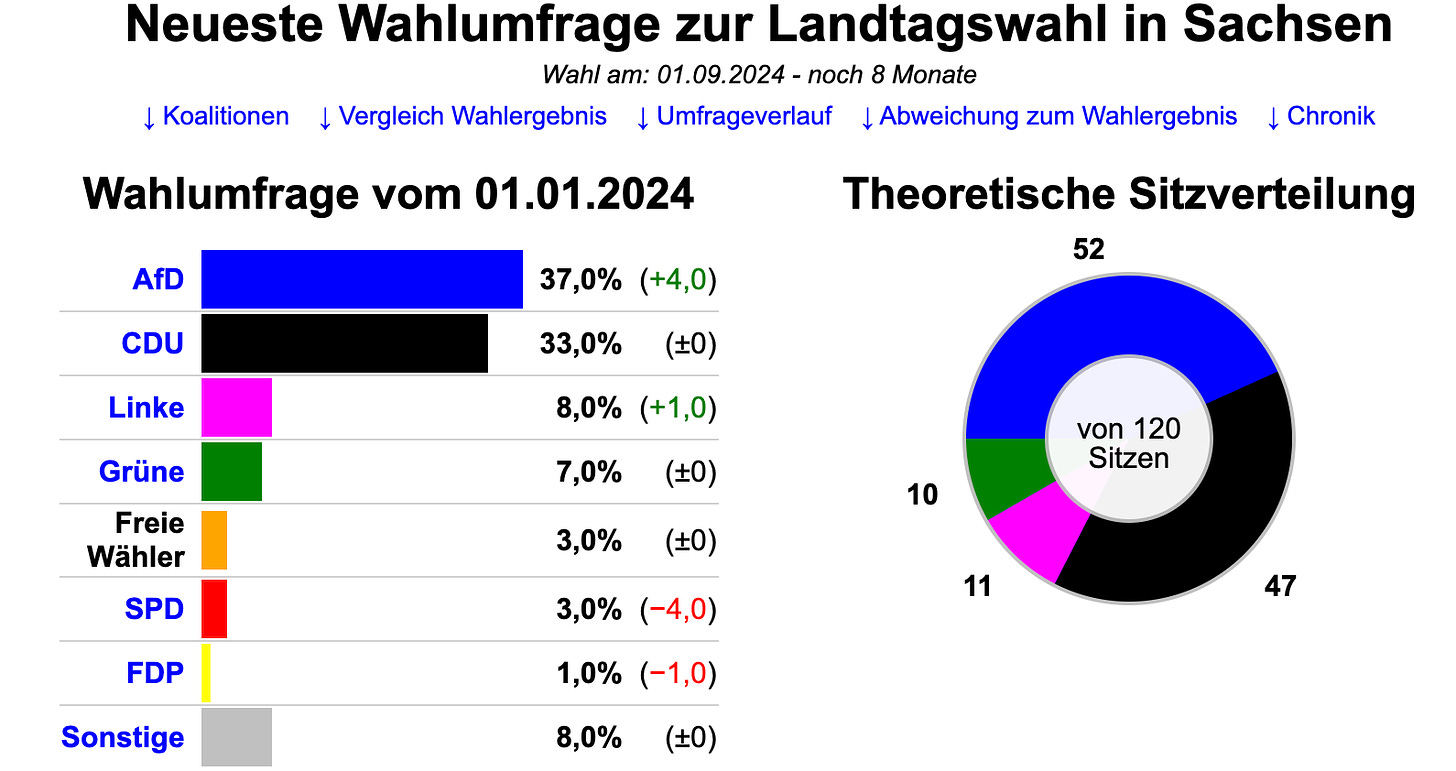In September, three East German states – Saxony, Thüringen and Brandenburg – will hold elections for state parliament. Alternative für Deutschland (AfD)is now by far the strongest-polling party in each of these states. In Saxony, for example, it is polling at an all-time high of 37%.
The SPD – the party of federal Chancellor Olaf Scholz – has fallen to just 3% support here, well below the threshold for entering parliament, and support for the liberal FDP has all but evaporated. If these were election results and the Saxon chapter of the CDU insisted on retaining its cordon sanitaire against the AfD, it would have to enter a coalition with either the Left Party (Die Linke) or the Greens or both. This would force the CDU to continue its association with Leftist policies that are deeply unpopular with its base, doing further long-term damage to the party.
The latest poll from Thüringen likewise has the AfD at 36.5%, and when somebody bothers to poll Brandenburg again, we’ll almost surely see similar AfD gains there. Unfortunately it is very hard to peel support from the CDU, even in East Germany; a lot of people from my parents’ generation will just never stop voting for them, no matter what they do. This is why I think, in the present landscape, the ceiling for AfD support in the East stands at around 40%. In Saxony, this is just short of the outright majority necessary to govern alone without any partners.
The pressure, however, is building within the CDU. Somehow, some way, something will give, and that something might just be a small faction within the CDU/CSU known as the WerteUnion, or the Values Union. The WerteUnion was founded in 2017 by Right-leaning members of the Union parties in response to Angela Merkel’s constant flirtations with the Left. The WerteUnion understands itself as a traditionalist conservative movement within the party, although CDU leadership refuses to extend the faction formal recognition and regards it with hostility.
Among the WerteUnion founders is Hans-Georg Maaßen, a lawyer and former president of the Federal Office for the Protection of the Constitution.
Maaßen has become an increasingly outspoken opponent not only of the CDU but of German politics in general. In response, the CDU under Friedrich Merz has further alienated him by instituting proceedings to kick him out of the party, even though Maaßen supported Merz’s candidacy to lead the party.
This week, Maaßen announced his plans to split from the CDU and make the WerteUnion into its own party. If the membership agrees, as it almost certainly will, the WerteUnion could field candidates in the upcoming East German elections. Maaßen says the move is necessary because the CDU establishment under Merz has insisted on “continuing… the Left-wing course” set by Angela Merkel, and has “failed to realise the catastrophic state of Germany and is not prepared to deal with Merkel’s disastrous policies”. The WerteUnion will “go its own way,” Maaßen has said, and – crucially – it will “tear down all firewalls”.
By that, Maaßen means that his party will cooperate with the AfD, a step the CDU has long refused. Come the autumn, in other words, there will be a new party ready to receive the support of traditional CDU voters who have been alienated by Merkel’s centrism but cannot bring themselves to support the evil populists of the AfD. Note that the WerteUnion wouldn’t have to be wildly successful to change the political calculus. If it can capture just 5% of CDU support in Saxony, it would have enough seats in the Landtag to form a coalition with the AfD. This is clearly the strategy that Maaßen has in mind.
Now, it is very hard to predict the prospects of a party that has yet to exist. Electoral success depends heavily on grassroots organisation at the local level, which is something you can’t call into existence overnight. The establishment is accordingly sceptical of Maaßen’s manoeuvre. It is just undeniable, however, that the political landscape in Germany is changing. The CDU, having ignored Franz Josef Strauß’s warning about failing to incorporate political movements to the Right of the Union, is in long-term decline; if the WerteUnion doesn’t succeed in splitting its voter base, others will try. There has long been speculation that the more conservative Bavarian CSU may try to do this by fielding candidates nationally. The SPD, meanwhile, having forgotten its socialist commitments to the working class, increasingly has no constituency at all, while the FDP is poised to disappear from the electoral map entirely. Finally, Sahra Wagenknecht has already split Die Linke (the heir to the DDR-era SED), with her initiative to found her own socialist immigration-sceptic operation.
Presently, the only parties with any vitality and future prospects are the Greens and the AfD. In the coming years, I expect the Green Party to assimilate the German Left, while a range of immigration- and Euro-sceptic parties emerge to compete with AfD on the Right. The cordon sanitaire can’t last in this environment; either the CDU will drop it or it’ll be hollowed out by rivals who will.
This piece originally appeared on Eugyppius’s Substack newsletter. You can subscribe here.













To join in with the discussion please make a donation to The Daily Sceptic.
Profanity and abuse will be removed and may lead to a permanent ban.
Excellent news! Far right(common sense) Europe…yay
One to watch is the farmers of Germany, with a huge protest scheduled for tomorrow, with more likely to come. Good on protestors for sticking it to the Green Minister, Habeck, who they prevented from getting off a ferry so he had to go back to where he came from. Check out the outraged hypocrisy from the Leftards though. A hair wasn’t harmed on his head, unlike various members of the AfD;
”German farmers in Schlüttsiel successfully blockaded German Economic Minister Robert Habeck’s (Greens) ferry last night as he was returning from vacation, with the move making headline news across the country.
Politicians from the Greens have reacted with fury to farmers in Schleswig-Holstein preventing Habeck (Greens) from leaving the ferry, with Agriculture Minister Özdemir describing them as “radicals” and “fanatics” who dream of overthrowing the government.
Habeck, along with the rest of the federal government, is pushing forward radical proposals to cut subsidies for farmers and increase taxes, which have prompted protests around the nation.
Habeck was forced to return to the island of Hallig Hooge, where he was vacationing. However, he has since returned home with the help of police.
“With all understanding for a lively protest culture, no one should care about such a brutalization of political mores,” wrote government spokesman Steffen Hebestreit early Friday morning on the X platform.
These are “people who don’t care about German agriculture,” said Özdemir on Friday on ARD. “They have wet dreams of overthrows, and that won’t happen. To be very clear: This is not acceptable.”
Climate activists from Last Generation have been shutting down roads, attacking art, and causing mass disruptions across Germany. However, some from the left have been openly supportive of the group.
The German government currently has abysmal approval ratings, with two in three Germans demanding snap elections.”
https://rmx.news/economy/german-farmers-blockade-green-ministers-ferry-as-he-returns-from-vacation-nationwide-farmer-protests-loom-on-jan-8/
Overthrowing? No. They dream of becoming the government – there’s a big difference.
I am surprised he didn’t call them “libertarian jihadists”.
funny
His (turkish) muslim relatives probably wouldn’t like that very much. He could call them civil disobedience nazis.
Voters in a democracy openly calling for change of government! That obviously musn’t be allowed to happen in country ruled by the Greens as this would be very bad for the planet.
Aside: The colours associated with the parties in the German ruling coalition are red (SPD), yellow (FDP) and green (Greens). Because of this, it’s known as “traffic light coalition” (Ampelkoalition). As part of the farmer’s protests, gallows with hanged traffic lights have been secretly erected in various public places during the past weeks.
The German inland secret service is – on behalf of the government – currently searching for the “terrorists” who did this.
When will Europeans wake up to the fact that GREENS are REDS
Also known as watermelons
These so-called subsidies aren’t really subsidies at all. At the moment, vehicles used for agricultural purposes are taxed less aggressively than private road vehicles, not the least because they don’t really use roads most of the time. The German government is in urgent need of money¹, and hence, it plans to extend road vehicle taxation to tractors etc.
¹ Background: The German government isn’t usually allowed to finance itself via debts as it sees fit as the constitution prohibits this. To deal with the effects of “Corona”, an additional credit line of 60 billion Euros was approved in 2021. As most of this money hadn’t been used for “Corona” so far, the coalition planned to transfer it to a different account that’s supposed to be used to pay for “climate and general change” (Klima- und Transformationsfonds), ie, essentially anything a politicians wants to spend money on. This was ruled unconstitutional by the German supreme court.
This was ruled unconstitutional by the German supreme court.
This means there’s now a 60 billion Euro black hole in the budget of the government.
Europe has been sleepwalking. The Liberal Progressive pretend to save the planet, diversity, equality, gender and mass immigration people must be REMOVED. ——-As soon as possible if Europe is not to turn into something that isn’t Europe (and that is me being polite)
In the funny world we’re currently living in, this is of course a threat to democracy.
Both the SPD and the Greens envision themselves as governers in lieu of the so-called victorious powers (Siegermächte), principally, the USA, tasked with subdueing and collecting triubtes from a hostile population. Any popular movement of Germans is of course a threat the partycracy forcibly installed (for the second time) after 1945 as this so-called democracy wouldn’t even exist without a principally voluntary military invention by the other so-called democracies.
It’s a threat to the anti-democracy favoured by the EU and some of the member states.
Özdemir is really just copying the hysterical political rethoric of the US democrats who (which?) always label any opposition to their plans by by members of the electorate as ‘coup’ (“overthrow the government”) intended to ‘subvert/ overturn democracy’.
In theory, we’re living in so-called pluralistic societies, where many different opinions on anything compete in a marketplace of ideas with the idea behind that being to work out something that’s practically sensible considering that we’re all just fallible humans and that – because of this – all our standpoints are inherently wrong to varying degrees. But that’s not the universe the American democrats and their international clique of lickspittles inhabit. Their’s is strictly black and white, the infallible forces of goodness and light fighting for the future of mankind vs 100% wrong and evil armies of darkness whose selfish macchinations will invariably lead to apocalypse and damnation, not only for mankind but really for all of the universe (usually referred to as the planet).
These people are fundamentally antidemocratic because different opinions which could all be equally valid simply do not exist for them. If they could, they would outlaw political opposition in the name of democracy because only they are the ones who really rule in the best interest of the people.